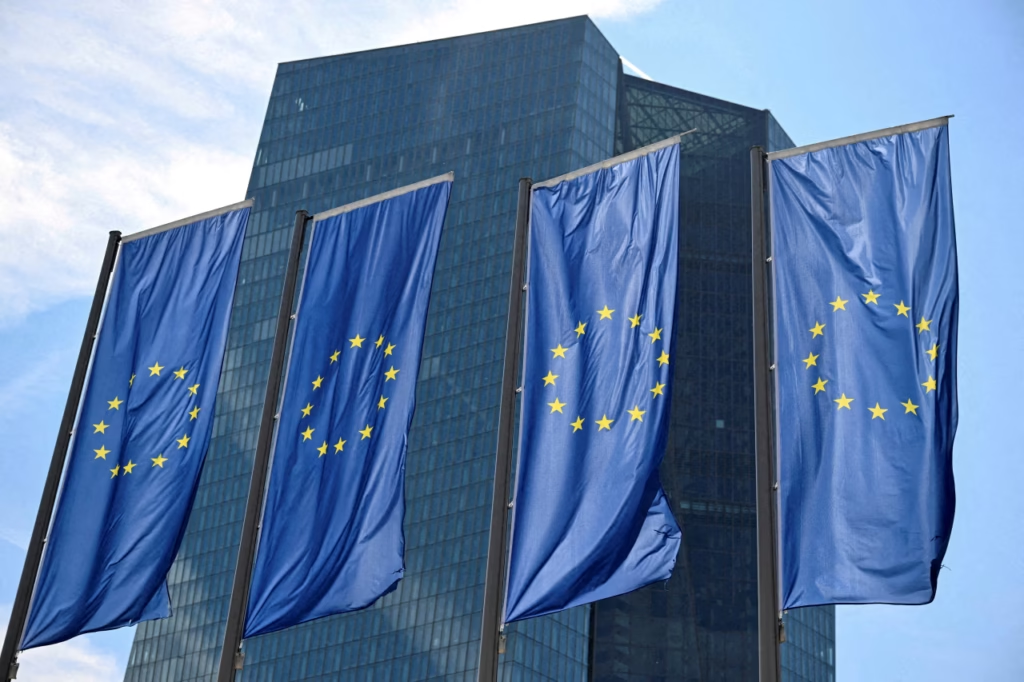There has been a big shift in Europe’s interest rate outlook. What looked like a slow, predictable chain of cuts by the European Central Bank (ECB) has been thrown into turmoil, as developments far from the continent—and from interest rates palaver in the U.S. Federal Reserve to the Bank of Israel—have ripple effects on the global monetary landscape.
Only weeks ago, ECB President Christine Lagarde was suggesting a “dialed-down but persistent” easing cycle. But in just over a week, a constellation of global signals have dramatically changed that approach. With a sharp spike in inflation surprising in Tel Aviv and U.S. fighters abruptly pausing monetary policy, the world’s central banks are speaking different languages—and forcing the ECB to reconsider its policies.
In Israel, the Bank of Israel (BoI) surprised markets by keeping rates unchanged instead of lowering, citing another global upside in energy prices caused by the continuing rise in geopolitical uncertainties in the region. Downgraded oil and commodity pricing reverberated through bond markets across Europe, especially in economies more exposed or reliant on global pricing, not to mention central banks’ signalling.
“Israel may seem far, but its inflation trajectory and energy dependencies are bellwethers for small, open economies,” said Dr. Markus Stein economist at the University of Cologne says. “And Europe is still in various ways vulnerable to such external shocks.”
Indeed, energy is once again starting to be a wild card in inflation, as Brent crude prices edge back above $90 per barrel amid tensions in the Middle East, and fears of energy-induced inflation are coming into play again in Frankfurt’s models.
Washington’s Wait-and-Watch: Mixed Signals for Europe
Back on the other side of the Atlantic, the Federal Reserve has declined to lower rates, saying that it would likely only lower rates once in 2025–down from the three cuts previously projected. In a press conference, Chair Jerome Powell said the Fed decided to pause due to “persistently elevated core inflation,” as well as “the labor market exhibiting resilience.”
This uncertainty has also raised eyebrows for Europe. “The Fed isn’t in a hurry to continue easing, and that makes it a bit more difficult for the ECB to chart a dovish path,” said Francesca Bellini, a strategist at BNP Paribas. “If the ECB cuts too quickly while the Fed stays, the euro could weaken significantly, which may then feed imported inflation.”
The euro already depreciated about 1.7% against the dollar in the last week, further raising questions about imported inflation–if food and energy, which are largely priced in dollars, stoke fresh inflation.
Bond yields in the Eurozone were, if not chaotic, certainly in flux. Germany’s 10-year bund yield increased by 15 basis points last week, while Italian yields also increased, indicating some jitters in the market as to the pace of easing. Conversely, the stock markets have been steady in the last week – buoyed by the continued strong earnings out of Europe’s tech and industrial companies.
“Investors are not sure if bad news is still good news,” a trader in Paris said. “Every new inflation print or Fed comment resets the expectations clock.”
What is next? The ECB approaches July carefully
Markets are now pricing in only a 40% chance of a rate cut at July’s ECB meeting, down from 70% just a fortnight previously. Analysts say a “wait-and-signal” approach may be appropriate for the bank, keeping rates unchanged while making revisions to the forward guidance to maintain bias and flexibility.
The analysts explained that based on the unpredictable patterns of inflation, energy prices, and the nonlinear movements from central banks globally, the rate game in Europe is no longer just a game played out of Frankfurt. It is a global performance from Tel Aviv to Washington with Frankfurt squarely in the dance floor middle.
FOR MORE NEWS VISIT QUESTEURO.COM

More Stories
European Leaders Advocate for Ukraine’s Inclusion in US-Russia Discussions
European Leaders Advocate for Ukraine’s Inclusion in US-Russia Summit Talks
European Leaders Advocate for Ukraine’s Role in US-Russia Negotiations